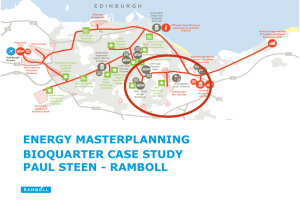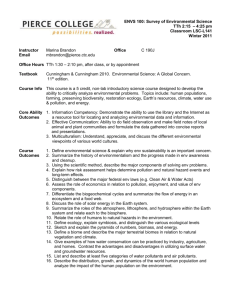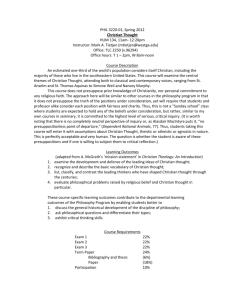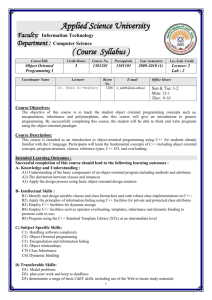File - HUN 4296 Nutrition and Health Issues
advertisement
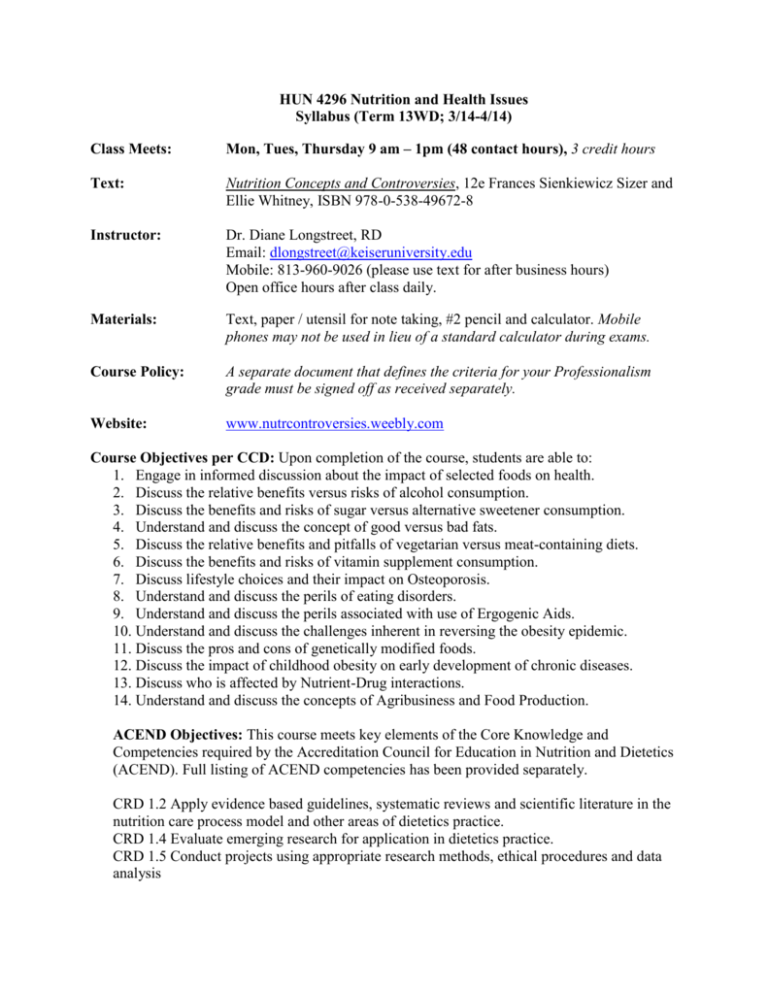
HUN 4296 Nutrition and Health Issues Syllabus (Term 13WD; 3/14-4/14) Class Meets: Mon, Tues, Thursday 9 am – 1pm (48 contact hours), 3 credit hours Text: Nutrition Concepts and Controversies, 12e Frances Sienkiewicz Sizer and Ellie Whitney, ISBN 978-0-538-49672-8 Instructor: Dr. Diane Longstreet, RD Email: dlongstreet@keiseruniversity.edu Mobile: 813-960-9026 (please use text for after business hours) Open office hours after class daily. Materials: Text, paper / utensil for note taking, #2 pencil and calculator. Mobile phones may not be used in lieu of a standard calculator during exams. Course Policy: A separate document that defines the criteria for your Professionalism grade must be signed off as received separately. Website: www.nutrcontroversies.weebly.com Course Objectives per CCD: Upon completion of the course, students are able to: 1. Engage in informed discussion about the impact of selected foods on health. 2. Discuss the relative benefits versus risks of alcohol consumption. 3. Discuss the benefits and risks of sugar versus alternative sweetener consumption. 4. Understand and discuss the concept of good versus bad fats. 5. Discuss the relative benefits and pitfalls of vegetarian versus meat-containing diets. 6. Discuss the benefits and risks of vitamin supplement consumption. 7. Discuss lifestyle choices and their impact on Osteoporosis. 8. Understand and discuss the perils of eating disorders. 9. Understand and discuss the perils associated with use of Ergogenic Aids. 10. Understand and discuss the challenges inherent in reversing the obesity epidemic. 11. Discuss the pros and cons of genetically modified foods. 12. Discuss the impact of childhood obesity on early development of chronic diseases. 13. Discuss who is affected by Nutrient-Drug interactions. 14. Understand and discuss the concepts of Agribusiness and Food Production. ACEND Objectives: This course meets key elements of the Core Knowledge and Competencies required by the Accreditation Council for Education in Nutrition and Dietetics (ACEND). Full listing of ACEND competencies has been provided separately. CRD 1.2 Apply evidence based guidelines, systematic reviews and scientific literature in the nutrition care process model and other areas of dietetics practice. CRD 1.4 Evaluate emerging research for application in dietetics practice. CRD 1.5 Conduct projects using appropriate research methods, ethical procedures and data analysis CRD 2.2 Demonstrate professional writing skills in preparing professional communications such as research manuscripts, project proposals, education materials, policy and procedures). CRD 2.3 Design, implement and evaluate presentations to a target audience (a quality presentation considers life experiences, cultural diversity and educational background of the target audience). CRD 2.5 Demonstrate active participation, teamwork and contributions in group settings. CRD 2.11 Demonstrate professional attributes within various organizational cultures (professional attributes include showing initiative and proactively developing solutions, advocacy, customer focus, risk taking, critical thinking, flexibility, time management, work prioritization and work ethic). CRD 4.6 Analyze quality, financial or productivity data and develop a plan for intervention. CRD 4.8 Conduct feasibility studies for products, programs or services with consideration of costs and benefits. CRD 4.9 Analyze financial data to assess utilization of resources. Week 1: Objectives 1, 2, 10 Read Chp 1-5, Chp 9 up to p362 (hold Eating Disorder Controversy as contrast to childhood obesity) Day 1 Monday 3/31/14 Getting started -Reflections exercise Pretest and Review of CCD, Syllabus, Rubric for Project and Presentation Chp 1– Sorting fads from fact, imposters from experts (add in Florida licensure law) Chp 9 – Obesity (exclude Controversy 9 – to be covered as the flip side to child obesity) Homework - Prove you can get a healthy diet from just food.- DUE Thursday Day 2 Tuesday 4/1/14 Quiz Chp 2- Use of nutrition guidelines, nutrient claims on food labels, “Superfoods”, DASH diet Chp 3 Controversy - Alcohol – risks v benefits; “Detox” Genetics / Nutrigenomics Day 3 – Thursday 4/3/14 Homework in lieu of quiz / Discussion Chp 3 – “Food Combining” and the realities of digestion Guest lecturer: Barabara Mahlmeiser, RD, LD/N, CCN Functional Medicine and the “Leaky Gut” Week 2: Objectives 3,4,5 Read Chp 4,5,6, Chp 15 pp585-597(hold sustainability issues as balance to Food Technology & GMOs) Day 1 – Monday 4/7/14 Quiz Chp 4 – Carbs (good, bad, and fake) Chp 5 – Fats (good, bad, and fake), TLC diet Video: Diet Wars (Atkins v Ornish / Pritikin) Day 2- Tuesday 4/8/14 Quiz Chp – 6 Protein / Debate on Vegetarianism / China Study controversy / Protein and satiety Wk 2 Day 3 – Thursday 4/10/14 Quiz – also submit completed study guide as homework by end of class Chp 15 –Hunger pp 585-597; global nutrition issues Midterm review Week 3: Objective8, 9, 12, 13 Read Chp 7, 8, 10, 11, 13 and 14 Day 1 – Monday 4/14/14 Midterm (lab available for those who finish exam early) Reconvene at 11 am Chp 7 – 8 Vitamins and Minerals Issues- Vitamin / Mineral / Supplement safety and issues Day 2- Tuesday 4/15/14 Quiz on Vitamins / Minerals Issues. Herbs, drugs, and nutrient interactions Chp 11, 13 & 14 Life Cycle Issues to include review Chp 9 Controversy - Eating disorders Midterm advisements Day 3 – Thursday 4/17/14 Turn in copy of completed Vitamin – Mineral graphic organizer study guide as homework Chp 12 Food safety, sustainability, food technology, GMO’s, “Bee-Pocalypse” Video excerpts: The Future of Food / Living Downstream Discussion Week 4: Objective 11, 14 Read Chp 12, 15 Day 1 – Monday 4/21/14 –Easter Monday – No class!!! Day 2- Tuesday 4/22/14 Projects due. Student presentations (10 minutes each). Comprehensive review and discussion Day 3 –Thursday 4/24/14 Final exam and Post-test Course Evaluation Method -Student performance is evaluated as follows: 10 % 15 % 20 % 25 % 25 % 5% 100 % Professionalism (Attendance, class participation) Quizzes, Class Activities, Homework Controversies paper and presentation Mid-term exam Final exam Post-test Total possible score




